Spotlight (188 found)
Disputed Territory: Mon Farmers’ Fight Against Unjust Land Acquisition and Barriers to Their Progress
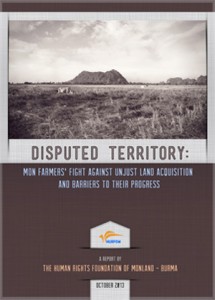 Over the years HURFOM has produced a number of accounts highlighting the hardships faced by Mon farmers who became victims of land confiscation or unjust land acquisition. In this report HURFOM follows-up on previously documented abuses and concentrates on an emerging new trend: farmers’ active and collective pursuits for rights to their land.
Over the years HURFOM has produced a number of accounts highlighting the hardships faced by Mon farmers who became victims of land confiscation or unjust land acquisition. In this report HURFOM follows-up on previously documented abuses and concentrates on an emerging new trend: farmers’ active and collective pursuits for rights to their land.
Disputed Territory aims to elaborate on the activities of and express solidarity with farmers who are resolutely, and in some cases for the first time, seeking justice regarding their land […]
The Use of Section 18 to Continue Human Rights Abuses in Burma
Section 18 of the Peaceful Assembly and Peaceful Procession Law is being frequently utilized to arrest and imprison political activists for undertaking human rights activism in Burma. AAPP (B) wishes to highlight the ongoing human rights abuses section 18 permits and to make the international community aware of the dangers this poses to the political freedom in Burma […]
• • •Corporate Accountability in ASEAN : A Human Rights-Based Approach
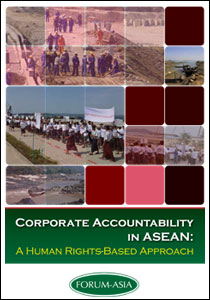 Corporate Accountability in ASEAN: A Human Rights-Based Approach assesses the impacts of business on human rights in the ASEAN sub-region. Originating from cases presented at two public hearings organised by civil society groups in 2011 in response to the ASEAN Intergovernmental Commission on Human Rights (AICHR)’s undertaking of a thematic study on the topic of “corporate social responsibility” (CSR) in ASEAN, this report documents cases of human rights violations in relation to business activities in the sub-region, and demonstrates that voluntary CSR initiatives promoted by businesses – and by ASEAN institutions – are insufficient […]
Corporate Accountability in ASEAN: A Human Rights-Based Approach assesses the impacts of business on human rights in the ASEAN sub-region. Originating from cases presented at two public hearings organised by civil society groups in 2011 in response to the ASEAN Intergovernmental Commission on Human Rights (AICHR)’s undertaking of a thematic study on the topic of “corporate social responsibility” (CSR) in ASEAN, this report documents cases of human rights violations in relation to business activities in the sub-region, and demonstrates that voluntary CSR initiatives promoted by businesses – and by ASEAN institutions – are insufficient […]
Report on the Human Rights Situation in Burma (January 2013 – June 2013)
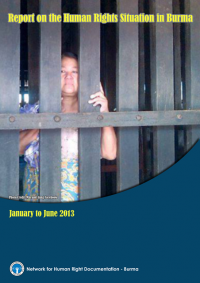 Over the six months from January to June 2013, ND-Burma documented 147 human rights violations across Burma. These violations occurred in areas of armed conflict but also in areas covered by ceasefires. Each violation is a specific incident, but it may involve any number of victims, from one victim of killing, to forced labor involving many victims, to the forced displacement of an entire village. ND-Burma’s findings demonstrate that, despite progress in reaching ceasefire agreements with non-state armed groups, the government has made little progress protecting the human rights of its citizens. Furthermore, continued arrests of human rights defenders demonstrate that the government is not serious about working with civil society to protect human rights […]
Over the six months from January to June 2013, ND-Burma documented 147 human rights violations across Burma. These violations occurred in areas of armed conflict but also in areas covered by ceasefires. Each violation is a specific incident, but it may involve any number of victims, from one victim of killing, to forced labor involving many victims, to the forced displacement of an entire village. ND-Burma’s findings demonstrate that, despite progress in reaching ceasefire agreements with non-state armed groups, the government has made little progress protecting the human rights of its citizens. Furthermore, continued arrests of human rights defenders demonstrate that the government is not serious about working with civil society to protect human rights […]
Drawing The Line: The Case Against China’s Shwe Gas Project, For Better Extractive Industries in Burma
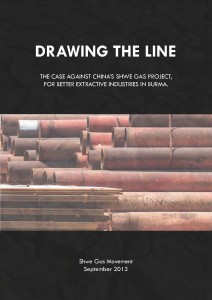 The Shwe Gas project, the largest extractive project in Burma, set to earn US$54 billion for the Burmese government, has just begun transferring Burma’s natural gas to China. As the first such project to become operational under the new quasi-civilian government, its management will set the precedent for how future extractive projects will be carried out as Burma opens up for investment and resource bidding. As it stands, the standard is not good […]
The Shwe Gas project, the largest extractive project in Burma, set to earn US$54 billion for the Burmese government, has just begun transferring Burma’s natural gas to China. As the first such project to become operational under the new quasi-civilian government, its management will set the precedent for how future extractive projects will be carried out as Burma opens up for investment and resource bidding. As it stands, the standard is not good […]
Rule By Law: An Analysis of the Use of Legislation to Stifle Civil Society Space in Burma
This paper is primarily an analysis of the raft of legislation that is in the process of being pushed through parliament to target HRDs, activists, protestors and CSOs, and the threat that such legislation poses to their fundamental rights – which Burma is legally bound to respect and protect under the 2008 Constitution. This paper will also look at the current situation of political prisoners to demonstrate how the legislation is being misused in collaboration with a compliant judiciary and the Myanmar National Human Rights Commission […]
• • •Burma Update: Serious Crimes Continue
This briefing paper summarizes crimes that have been committed in Burma over the last year. It details the ongoing abuses and restrictions against Rohingyas, continuing anti-muslim violence, restrictive legislations being used to arrest and prosecute activists, farmed and human rights defenders, and the Burma Army’s offensives against the Kachin Independence Army and other non-state armed groups despite peace agreements.
• • •Whose Guns Are Silent?: An Analysis of Burma’s Fractured Peace Process
This paper is an analysis of the current situation with recommendations to the parties concerned. It is based on interviews with representatives of ethnic non-state armed groups (NSAGs), community-based organizations and civil society groups. On a state visit to the United Kingdom in July, President Thein Sein stated, “Very possibly, over the coming weeks, we will have a nationwide ceasefire and the guns will go silent everywhere in Myanmar for the first time in more than 60 years.” There is a significant gap in the pronouncements of the Thein Sein government and the realities of the ground situation in Burma’s ethnic areas: this paper seeks to explain that gap […]
• • •Burma Risk Assessment
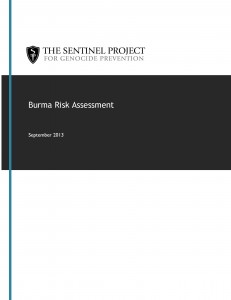 Following extensive research, the Sentinel Project has concluded that the risk of genocide or related mass atrocities in Burma is extremely high. Despite recent democratic reforms in the country, violence, discrimination, and extrajudicial killings continue and are mostly directed toward the Muslim Rohingya minority in Rakhine state. Violence and other crimes against the Rohingya, which are conducted by both state and non-state groups, are both widespread and systematic […]
Following extensive research, the Sentinel Project has concluded that the risk of genocide or related mass atrocities in Burma is extremely high. Despite recent democratic reforms in the country, violence, discrimination, and extrajudicial killings continue and are mostly directed toward the Muslim Rohingya minority in Rakhine state. Violence and other crimes against the Rohingya, which are conducted by both state and non-state groups, are both widespread and systematic […]
Civil Society Recommendations on the Myanmar National Human Rights Commission Law
On August 2, 38 civil society organizations, community-based organizations and networks from Burma send to Thura U Shwe Mann, Union Parliament Speaker, recommendations and proposed amendments to the Myanmar National Human Rights Commission (MNHRC) draft law in order to ensure the MNHRC’s independence […]
• • •








 All posts
All posts